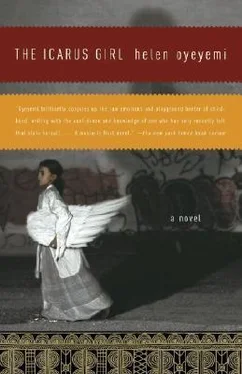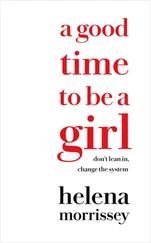“I think I’d better go and find her,” she added.
Trish shrugged, laughing.
“All right, suit yourself.”
Jess didn’t remember to show her mum the poem until the next morning, just before school. The day started with a general feeling of discontent. Her mum read the poem at the kitchen table as she ate her bacon sandwich. When she got past the first line, she put down the sandwich. Her lips began moving without any sounds coming out as she read the poem to herself, then she read it again, her eyebrows raised. Jess had written By Jessamy Harri son and Titiola at the bottom. Even if TillyTilly wasn’t real, she had reminded herself, she still deserved credit for the poem. She would have to discuss the realness thing with TillyTilly today, if she saw her.
She couldn’t even begin to think what she meant by “not real.”
Jess was tempted to spatter her porridge, but knew it drove her mum mad, and so refrained, hoping to be rewarded with some positive comments about the poem.
“Jess,” her mum said, finally, putting the sheet of paper down, “are you sure that you wrote this?”
Jess drank some orange juice before answering, drinking slowly to show how offended she was.
“Yes, me and Tilly did. What’s wrong with it?”
Her mum looked at the poem again, shook her head.
“How old is Tilly again?” she asked, suddenly, looking at Jess.
Jess shrugged uncomfortably.
She felt as if she was keeping a terrible secret for her friend: The thing is, she’s not real, but it’s a secret.
Her mum picked her sandwich up again and took a bite, looking reflective. She kept glancing down at the poem.
“Muuuuum,” Jess said impatiently.
“Mmmm?”
“What d’you think of it? D’you like it?”
“Jess, if you were unhappy, you’d tell me, wouldn’t you, darling?”
Jess was confused. This had nothing to do with anything. She was now being forced to consider her answers so as not to make her mum cross with her, when all she wanted was for her mum to like the poem. Her mum waited without appearing to be waiting, eating her sandwich, checking her watch. They were going to be a little late, as usual.
“Yes,” Jess said finally in a very small voice. “Do you like the poem, though, Mummy?”
Her mum stood up and got Jessamy’s coat, began helping her into it.
“It’s. . quite mature, Jess. It’s a bit of a sad poem, isn’t it?”
Don’t ask me about it, I’m asking you.
“What were you and Titiola thinking about when you were writing it?” her mother asked when they headed through the park to school. Jess moped. There was something too cheerful about her mother today, something too jaunty in her walk and the questions she asked. Jess could sense it, it was almost tangible; her mother didn’t think that TillyTilly was real either. That must be it.
“We were just finding rhymes.”
Her mum nodded. “Right. Well, I do like it, Jess, it’s just. . well, I think it’s. . I like it, but if you want the truth, it. . well, sort of confuses me that it was written by you. Do you understand what I’m saying?”
“You think it’s too mature.”
“Yes.”
“But you’re the one who reads me Shakespeare and stuff! How do you want me to write?”
Her mum ruffled her hair.
“Jesus on toast, Jess, I dunno.”
In the sitting room, Jess sat watching her mother dial, calling Nigeria. Her mum looked up and flashed her a smile in between punching in the last two numbers, and Jess smiled back, preparing herself for the odd feeling of hearing Bodija over the phone again. They both waited.
“Hello? Iya Jessamy calling from London!” her mum said.
There was a static pause, then Jess could hear a faint, crackling shriek of delight sounding from the other end, then a string of questions in piercing, fast Yoruba. It sounded like Aunty Funke, but it could well have been Aunty Biola. Jess watched her mum throw back her head and laugh, before responding in equally fast Yoruba. She turned, treading a small half circle on the carpet, then suddenly looked at Jess. She seemed to catch herself and winked at Jessamy before questioningly indicating the phone. Jess nodded.
“Funke, here is your girl, o,” she said in English, laughing. She handed the receiver to Jess and dropped into one of the sitting-room chairs.
Jess gripped the receiver, pulling the mouthpiece closer to her face. Her hands were slightly sweaty and the phone felt slippery. She licked her lips.
“Hello, Aunty,” she said, listening for the audible echo of her voice bouncing down the phone line in a way that it did not when she was speaking to somebody in England.
There was that unnerving split-second delay before Aunty Funke crackled so that it was sharp and shrieking, “Jess! How is everything, eh?”
The question was imbued with unmistakable menace and malice.
Jess was instantaneously miserable and frightened; the way that she always was at first. This fear lasted a few seconds, then, before it was allayed and she could speak to her aunt comfortably, the phone would be taken from her by her mum.
On the telephone to Nigeria, Jess was seized by the fear that it wasn’t Aunty Funke she was talking to, but some thin, winding spirit that had intercepted the call, taking on her aunty’s accent and tone of voice, turning every sentence into a shrill cleaving of the nerves.
“I’m fine,” she whispered, letting the sound be stolen from her as the echo mocked. Now she had said she was fine twice. She almost added “Aunty,” but caught herself. This wasn’t her aunty Funke who made puff-puff in her lucky pan and sang while washing up at the sink and complained loudly — in English, for Jess’s benefit — whenever she was annoyed. The response was again delayed.
“Say what? Ah-ah, you this girl, won’t you speak up?” The wicked spirit thief sounded darkly amused, spitting out the question although they both knew that Jess’s throat was too dry from this ordeal for her to talk properly.
Every single time, she thought it might be different, but it never was; she never got to speak to her aunty Funke.
“I said. . I’m fine,” she bellowed into the phone. She was suddenly enraged beyond belief, unaware of the fact that she was almost snarling. “How are you ?” she added, belligerently.
The echoes were louder this time. Her mum took the phone from her, arching her eyebrows in bemusement before speaking to her sister in Yoruba. Jess couldn’t understand exactly what her mum was saying, but it sounded apologetic. She wiped her hands on the skirt of her school dress, and the green-and-white check reminded her of Tilly. Without another word, she left the room and went through the kitchen and out of the back door.
But Jess couldn’t find TillyTilly. She was lost to her, shrunken from her sight.
Jess understood implicitly that this had something to do with her realising that Tilly wasn’t real. She wished she hadn’t thought it, that her happiness hadn’t been stretched and pulled out of shape by that idea. How could she have. .?
As she ran through the park, a flurry of arms and legs and dress, searching frantically for her friend, the dread and panic thickened and bloomed in her lungs. She forced herself to stand still on the pavement, made herself draw in deep, deep breaths until she thought that she might suck herself inside out with the force of her breathing. A group of older children chasing each other down the other side of the pavement all stopped to look at her. One of them was a boyish-looking brown-haired girl wearing a baggy off-white T-shirt with Heartbreak High written on it in yellow letters. The girl yelled out, “Oi, wassamatter with you, man?”
Читать дальше












